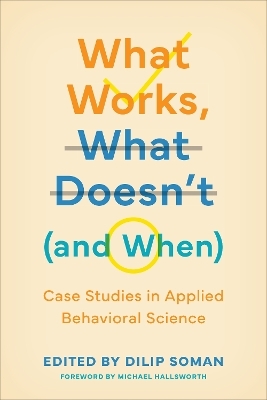
What Works, What Doesn't (and When)
University of Toronto Press (Verlag)
978-1-4875-4873-5 (ISBN)
How well do behavioral science interventions translate and scale in the real world? Consider a practitioner who is looking to create behavior change through an intervention – perhaps it involves getting people to conserve energy, increase compliance with a medication regime, reduce misinformation, or improve tax collection. The behavioral science practitioner will typically draw inspiration from a previous study or intervention to translate into their own intervention.
The latest book in the Behaviourally Informed Organizations series, What Works, What Doesn’t (and When) presents a collection of studies in applied behavioral research with a behind-the-scenes look at how the project actually unfolded. Using seventeen case studies of such translation and scaling projects in diverse domains such as financial decisions, health, energy conservation, development, reducing absenteeism, diversity and inclusion, and reducing fare evasion, the book outlines the processes, the potential pitfalls, as well as some prescriptions on how to enhance the success of behavioral interventions. The cases show how behavioral science research is done – from getting inspiration to adapting research into context, designing tailored interventions, and comparing and reconciling results.
With contributions from leading academics and seasoned practitioners, What Works, What Doesn’t (and When) provides prescriptive advice on how to make behavior change projects happen and what pitfalls to watch out for.
Dilip Soman is the Canada Research Chair (Tier 1) in Behavioural Science and Economics, a professor at the Rotman School of Management at the University of Toronto, and the director of Behavioural Economics in Action at Rotman (BEAR) research centre.
Acknowledgments
Contributors
Foreword: Behavioral Science and “What Works” – Inseparable but in Tension?
Michael Hallsworth
Preamble: What Works, What Doesn’t (And When)
Dilip Soman
1. Translating Laboratory Research on Conflict-of-Interest Disclosures to Understand the Psychological Effects in the Real World
Sunita Sah
2. Translating and Scaling Laboratory Research on Time-Saving Services to Increase Well-Being of Working Mothers
Ashley Whillans
3. Behaviorally Informed Reminders: Translating Mindset Research to Improve Task Persistence
Joonkyung Kim and Dilip Soman
4. A Conceptual Replication of the Effects of Gamification on UK Adults’ Ability to Reach a Savings Goal
Nethal Hashim, Irene Scopelliti, and Janina Steinmetz
5. Translating Interventions to Improve Competence, Motivation, and Support of Heating Professionals to Increase Energy Efficiency in Swiss Buildings
Ulf J.J. Hahnel, Christian Mumenthaler, Tessa Dent Ferrel, and Tobias Brosch
6. Taking Context Seriously: Iteratively Translating Behavioral Interventions to Create Anemia Preventing Habits in Rural India
Anisha Singh and Steve Wendel
7. Translating Research on Goal-Setting to Enhance the Wellness of UK Social Workers
Shibeal O’Flaherty, Michael T. Sanders, and Ashley Whillans
8. Horizontal Scaling of Accuracy Prompts to Reduce Digital Misinformation Sharing in Canada
Lauryn Conway, Nicholas B. Diamond, and Chiara Varazzani
9. Customizing Social Norm Nudges by Format and Reference Group to Reduce Water Consumption among Israeli Households
Eyal Pe’er
10. Translating Research on Ease of Payment and Driver Engagement to Reduce Bus Fare Evasion in Santiago
Shannon O’Malley, David A. Pizarro, Olga E. Rodriguez-Sierra, Juan Camilo Salcedo, Wardah Malik, and Kelly Peters
11. Translating Social and Planning Interventions to Increase Self-Identification among Canadian Public Servants
Haris Khan, Meera Paleja, Renante Rondina, and Elizabeth Hardy
12. Translating and Scaling Social Norms to Reduce Antibiotic Prescription in New Zealand
Alex Gyani
13. Horizontal Scaling of Planning Prompt Interventions to Help Tax Compliance in Canada
Nicole Robitaille, Julian House, and Nina Mažar
14. Horizontal Scaling of a Prejudice Reduction Intervention in Australia
Wing Hsieh, Nicholas Faulkner, and Rebecca Wickes
15. Horizontal Scaling of Reminders to Encourage COVID-19 Vaccination among the Elderly in Latvia
Andris Saulītis
16. Reducing Student Absenteeism at Scale: Translating Social Norms and Attention Interventions
Todd Rogers And Avi Feller
17. Replicating, Adapting, and Scaling Rule of Thumb–Based Business Management Training to Help Entrepreneurs across the Developing World
Lois Aryee, Manasee Desai, and Mukta Joshi
Epilogue: Lessons Learned and the Way Forward
Dilip Soman
| Erscheinungsdatum | 02.02.2024 |
|---|---|
| Reihe/Serie | Behaviorally Informed Organizations |
| Zusatzinfo | 9 colour illustrations, 5 colour figures, 7 b&w illustrations, 44 b&w figures, 41 b&w tables |
| Verlagsort | Toronto |
| Sprache | englisch |
| Maße | 159 x 235 mm |
| Gewicht | 780 g |
| Themenwelt | Geisteswissenschaften ► Psychologie ► Arbeits- und Organisationspsychologie |
| Sozialwissenschaften ► Politik / Verwaltung ► Staat / Verwaltung | |
| Wirtschaft ► Betriebswirtschaft / Management ► Planung / Organisation | |
| Wirtschaft ► Volkswirtschaftslehre ► Wirtschaftspolitik | |
| ISBN-10 | 1-4875-4873-7 / 1487548737 |
| ISBN-13 | 978-1-4875-4873-5 / 9781487548735 |
| Zustand | Neuware |
| Informationen gemäß Produktsicherheitsverordnung (GPSR) | |
| Haben Sie eine Frage zum Produkt? |
aus dem Bereich


